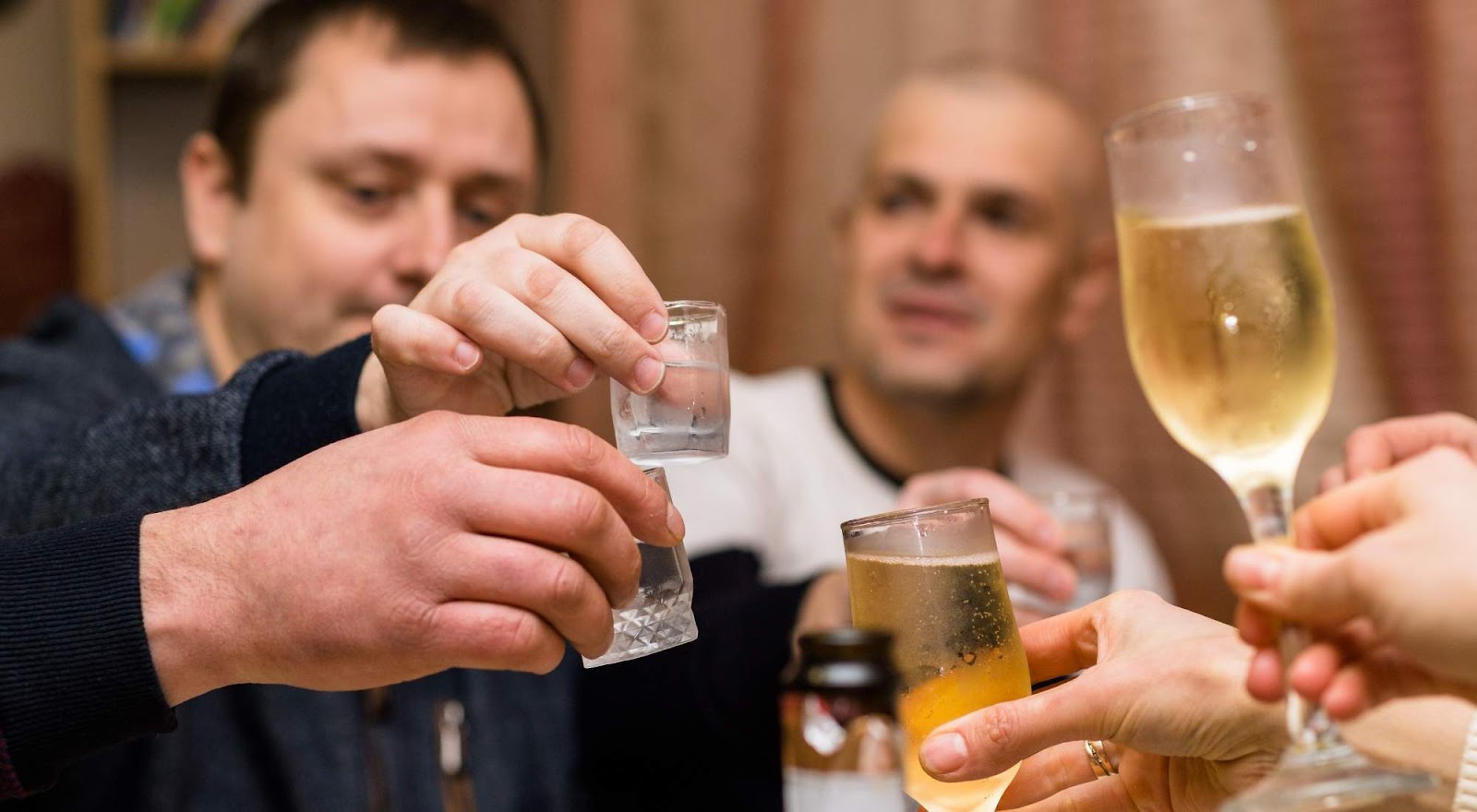From Risk Factors to Recovery: Why People Become Alcoholics

It doesn’t always start with heavy drinking.
Sometimes, it begins with a glass of wine after a long day, or a few beers to unwind with friends. At first, it feels normal — even harmless. But over time, what once felt like a choice starts to feel like a need. The hangovers get worse, the guilt builds, and promises to “cut back” begin to blur into broken patterns.
For many, this quiet slide into dependency doesn’t come from weakness or lack of willpower. It comes from trying to cope with stress, pain, trauma, or simply the weight of daily life. And by the time someone realizes alcohol is no longer a way to relax, but something they can’t go without, they may already feel trapped.
If you or someone you care about is facing the quiet struggle of alcohol dependence, know that you’re not alone — and recovery is possible.
Explore the psychological, social, and biological reasons why people become addicted to alcohol, and see how Dove Recovery provides a path toward lasting healing.
Table of Contents
- What Is the Leading Cause of Alcoholism?
- Why Do People Become Addicted to Alcohol? 6 Possible Causes
- The Progression of Alcoholism
- Hope and Healing for Alcohol Use Disorder Through Treatment
- Recovery Starts With Understanding Your Why — We’re Here To Help
There is no single “leading cause” of alcoholism. Most experts agree that genetic vulnerability accounts for roughly 50–60% of the risk, while environmental and psychological factors make up the remainder. At Dove Recovery, we treat all of these contributing factors through personalized, evidence-based care.
While genetics may set the stage, alcoholism often develops through a combination of inherited traits and life experiences. Stress, trauma, mental health conditions, and early exposure to alcohol can all influence a person’s risk.
That’s why effective treatment, like the programs offered at Dove Recovery, must address the full picture — not just the drinking behavior, but the root causes beneath it.

Understanding why people become addicted to alcohol requires a multifaceted approach, as various factors contribute to the development of alcohol use disorder (AUD). While genetics plays a significant role, environmental, psychological, and social influences also play crucial parts. Below, we explore six key factors that can lead to alcohol addiction.
#1: Family History and Genetic Factors
Genetic factors play a significant role in the development of AUD. Twin and adoption studies consistently indicate that approximately 50–60% of the risk for developing AUD is inherited. For instance, research published by the Association for Psychological Science highlighted the importance of genetic influences on alcoholism risk, especially in men.
Moreover, a more recent study by the National Institute on Alcohol Abuse and Alcoholism (NIAAA) found that individuals with a family history of alcoholism exhibited reduced brain growth compared to those without such a history, suggesting a genetic or environmental influence associated with parental drinking.
At Dove Recovery, we recognize the profound impact of genetic and familial factors on alcohol addiction. Our personalized treatment plans are designed to address these underlying causes, offering hope and healing to those affected.
#2: Biological Drivers
Some people are more vulnerable to alcohol addiction due to how alcohol affects their brain’s chemistry and reward pathways. A study by Mount Sinai researchers shows that alcohol’s byproduct, acetate, alters gene expression in brain areas linked to memory and reward, which can contribute to addiction.
Additionally, studies on brain imaging reveal that people with alcohol use disorder often have changes in reward centers like the ventral striatum, making them more sensitive to alcohol cues and less motivated by other rewards.
#3: Social and Environmental Triggers
Social and environmental factors play a powerful role in why people become addicted to alcohol. Peer pressure and a culture that normalizes social drinking can make it difficult to resist excessive alcohol use, especially among young adults.
Work-related stress, financial difficulties, and other lifestyle challenges often drive individuals to use alcohol as a coping mechanism. Over time, this can lead to dependence as drinking becomes a way to manage overwhelming pressures.
At Dove Recovery, we address these external triggers by helping clients build healthier coping strategies and create supportive environments that foster long-term recovery.

#4: Psychological and Emotional Influences
Many people turn to alcohol to cope with psychological challenges such as stress, anxiety, or depression. Using alcohol as a form of self-medication can provide temporary relief but often deepens dependency over time.
Trauma, whether from childhood abuse, loss, or other painful experiences, is a significant risk factor for developing alcohol addiction. The emotional pain can drive individuals to seek escape through drinking.
Low self-esteem also contributes, as some use alcohol to mask feelings of inadequacy or social anxiety.
#5: Co-Occurring Mental Health Conditions
Alcohol addiction often doesn’t exist in isolation. Many people struggling with AUD also face mental health conditions such as depression, anxiety, bipolar disorder, or PTSD. These co-occurring disorders can fuel each other, making both more difficult to treat.
At Dove Recovery, we provide integrated treatment that addresses both alcohol addiction and underlying mental health issues simultaneously. This dual approach improves outcomes by ensuring that clients receive comprehensive care tailored to their unique needs, setting the foundation for lasting recovery.
#6: Early Exposure to Alcohol and Underage Drinking
Early exposure to alcohol significantly increases the risk of developing alcohol use disorder (AUD) later in life. Research indicates that individuals who begin drinking before the age of 14 are more likely to develop alcohol dependence at some point in their lives compared to those who start drinking at age 21 or older.
A recent study published in Addictive Behaviors found that permitting teens to drink alcohol at home, even just "sips," can lead to the development of unhealthy relationships with alcohol in adulthood. Contrary to the belief that supervised drinking reduces harm, the data indicate that parental permission for underage drinking normalizes the behavior, increasing future risks of alcohol dependency, heavy drinking, and related issues.
Alcohol use often starts casually but can gradually escalate into dependence as the body develops tolerance, requiring more alcohol to achieve the same effect.
Over time, reducing or stopping drinking can trigger withdrawal symptoms like anxiety, tremors, and nausea, making it hard to quit. This cycle of increasing tolerance and withdrawal drives continued drinking and deepens addiction.
Recognizing these signs early is vital, and treatment at facilities like Dove Recovery can help break this harmful pattern and support lasting recovery.
Alcohol use disorder is a complex condition that is difficult to overcome without professional support. Attempting to quit alone often leads to relapse because addiction involves physical, psychological, and social factors that require specialized care.
At Dove Recovery, our outpatient recovery programs offer flexible, personalized treatment designed to fit your lifestyle while providing comprehensive support. These programs combine evidence-based therapies, group counseling, and holistic approaches like mindfulness and wellness activities to address the whole person — not just the addiction.
Therapy helps uncover underlying causes and builds coping skills, while group support fosters connection and accountability, which are vital for sustained recovery. Holistic care nurtures physical and emotional well-being, making healing more complete. With Dove Recovery’s compassionate approach, hope and healing are within reach for anyone struggling with alcohol addiction.

Every journey to recovery begins with a simple but powerful question: Why do you want to change? Understanding your personal reasons for overcoming alcohol addiction is the first step toward lasting healing. At Dove Recovery, we’re committed to helping you uncover your “why” and supporting you every step of the way.
With personalized treatment plans, compassionate care, and a strong community, Dove Recovery offers the tools and hope you need to reclaim your life. You don’t have to face this alone — reach out today and start your path to recovery with us.

